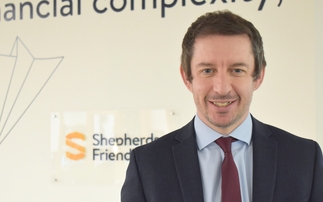Stuart Scullion, the new chairman of the Association of Medical Insurers and Intermediaries (AMII), tells Fiona Murphy about his plans for leadership.
Scullion, who is also managing director of The Private Health Partnership, had previously been a vital part of AMII's executive structure.
He took over from former chairman Wayne Pontin, managing director of Positively Healthcare who stepped down after three years as chairman of AMII.
In his opening speech as chairman at the AGM, held in April in Milton Keynes, Scullion urged the PMI and cash plan industry to recognise the importance of wellness.
Scullion said: "If you look at the insurance industry as a whole, the PMI and cash plan element of that industry is relatively small. For me, the recent emergence has been not sticking with the tradition of cash plan and PMI, but to realise that the industry now is a health, wellbeing and protection industry.
"There are many of us in the room who actively participate in each of those individual sectors as part of our day to day job. On this theme of cohesion it makes absolute sense to me that as an organisation we are reflective and representative of the combination of those factors and that we don't consider them to be in isolation.
"And so when we look at the future we need to think of a broader vision, not in a narrow and constrained way. We need to consider that the industry that we are participating in will be managing wellness because I think that will be key as we move forward.
"I think we will continue to treat illness in the way that private medical insurance has done, aligned and associated and working with an NHS. I think there is a need as I have said previously for us to have a better understanding of mental health and I think each of the political parties sees that and there is a will for that to take place.
"But there is actually a requirement for us to make a different provision towards the care of the elderly. We are an ageing population and sadly more and more people are suffering from the physical and mental ailments that you get in elder life and the current system to care for them in inadequate."
Setting membership standards
Speaking to Scullion two months on, the wider push for wellness still dominates the conversation in addition to AMII's voice for the private medical insurance intermediary.
But that definition has stretched in recent years – to move away from solely representing the interests of the small PMI adviser, the one man band, if you will.
The organisation's remit has moved to stand for larger intermediaries as well as inviting insurers to join as corporate partners.
There are currently 16 insurer members and Mercer is an example of a larger adviser firm having joined in February 2015.
The goalposts have moved yet again as AMII is inviting other partners outside of the health insurers to join too.
While this process did not begin recently and the change of name for the organisation to reflect its insurer partners happened in 2013, it is something that Scullion is keen to steer.
"We want to be truly representative of the industry as a whole, not just the smaller intermediary. AMII should be representative of the wider health and wellbeing, as care is going to become increasingly about managing wellness. Whether that's treating acute illnesses or how do we help people with chronic conditions?"
Scullion explains that AMII is in discussion with three new members, who are all at varying stages of commitment and can't be revealed at this time. Although he does allude to dental and international memberships as being another area for consideration.
He also believes there are clear benefits for both intermediary and provider members in that there is a clear sense of give and take. Intermediaries sit on the provider committee and vice versa, to ensure all views are heard.
The providers also pay fees similar to what they paid in the past to attend or sponsor the trade body's events, providing AMII with a greater sense of security.
"In the bigger picture, the corporate members need to understand and engage with what AMII is trying to achieve. We cannot raise professional standards on our own. It needs all parties that are currently involved in the industry.
"We can buck the trend of poor trust in insurance by being the bastion of good advice and restoring consumer confidence. It's not easy but we are committed to it.
"We've got fantastic corporate members who are really supportive and understanding what we are trying to do and coming to us with ideas to help the industry. My advice is, when you come to AMII, leave your business at the front door.
"If someone's reason for joining is about furthering their own business rather than how to drive the wider indu"stry forward, they've probably come to the wrong place."
He says key focuses for AMII at the moment, which tie into this sense of unity, include transacting business more effectively and raising standards among intermediaries.
"We're in conversation with two providers to simplify processes and work with them more effectively to cut costs and add value for consumers. We are also having a debate on letters of appointment and letters of authority – this superficially works reasonably well – there are still unscrupulous people out there.
"The other thing is the AMII code of ethics – we believe this is absolutely fundamental to rebuilding confidence with consumer with anyone selling any form of insurance. We're almost thought of as being worse than estate agents. We should be proud of what we're doing and have the consumer and the regulator feel confident in us."
Standards bearer
In terms of raising standards, Scullion has led by example. In his adviser business, PHP, he passed his Cert II qualification and made it mandatory for all advisers and administrators in the business to pass examination IF7 or take the Cert II. A similar goal is now being extended to all AMII intermediary members.
"I recognised that PHP could afford it, for smaller businesses taking the qualifications is expensive, so we wanted a vehicle to do this for them.
"We are in dialogue with the CII in order to provide us with support to raise professional standards through exam structure. We are asking: how can we run seminars for intermediaries and insurers to get through the examinations.
"Yes we have got [some AMII members] saying ‘this is too late in my career and I don't want to do this now'.
"If they choose not to do them, I appreciate that's their decision but as a potential customer, I would ask how are you qualified to give me advice? Consumers are more likely to engage and transact business with someone who had a professional qualification running though the business.
"It's about the positioning of intermediary qualifications eventually the consumer will say, I want to go to a business with professional approach and formalised qualification over another business.
"It's about Return and Investment and competitive advantage too. You need to weave that into your pitch and script for potential clients."
Lobbying?
Scullion does discuss the current issues with the NHS such as poor GP access and how we will also see employers have a bigger duty of care to employees in terms of wellbeing. He is also highly interested in the use of big data, telemedicine, welfare reform and issues around purchasing, distribution and cost in the PMI market.
However, he says: "I don't see AMII as being a political lobbying group. At this stage we would like a voice for health and wellbeing in government and other associated bodies to want to talk to us about some of these issues."
Also, how do you see yourselves serving members in the future? Will you improve communications with your members and what about updating your out of date website, which members have complained about in other trade publications?
He agrees: "The comments were valid regarding the website. I've got a meeting to discuss the website being completely revamped. We don't think presentation is fit for purpose and needs to reflect intermediary and provider side of business."
Overall, Scullion is hopeful and passionate about what he can bring to the role and the impact his leadership will have on the trade body.
"I am passionate about this – about giving something back and making a difference. I'm determined to drive AMII forward through my tenure."











